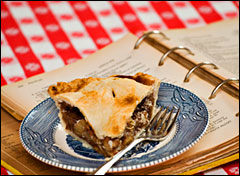Dear Umbra,
I am trying to eat local foods within the seasons, but most of my cookbooks include ingredients from multiple seasons in a single recipe. Can you offer any cookbooks or advice for finding more seasonal recipes?
Yours locally (and in season or preserved),
Katie
Somerville, Mass.
Dearest Katie,
Good for you — and good for you. Isn’t it too bad Gristmahanukwanzakah comes after Thanksgiving? Cookbooks make great gifts, but we need them in advance. I feel thanksgiving for the library, where we can test drive before committing to a wish list.

Cooking local: easy as pie?
The eat-local notion has settled into full-on movement status, which means there are blogs, websites, how-to guides, maps, and … cookbooks. It’s important to also remember that in the days before refrigerated trucks, container freight, and canned food, all cookbooks were fairly local — which means the classics are still useful. No kitchen should be without a few cookbooks of simply prepared, traditional foods, whether that is the Joy of Cooking, The Silver Spoon, or any book from a culture with a climate similar to yours (the Larousse Gastronomique is the French cooking bible, which is encyclopedic and would be useful if only French cuisine were “simple”).
The cookbooks I use most, down here in the Grist CSA-supplied basement kitchen, are Deborah Madison’s Vegetarian Cooking for Everyone, Alice Waters’ The Art of Simple Food, the Joy (aka “What would Irma and Marion do?”), and now Mark Bittman’s How to Cook Everything Vegetarian. Bittman’s previous book, How to Cook Everything, is out in a new edition, just in time for the winter cooking blitz. These books work because they show the basics but also give tips for expanding recipes. And though they suit those who like to shop based on a recipe, they also work well when you need recipes that work with certain ingredients.
Here are a few other books I’m curious about: Deborah Madison also wrote Local Flavors: Cooking and Eating from America’s Farmers’ Markets. Madhur Jaffrey’s World Vegetarian has good word-of-mouth. Alice Waters wrote Chez Panisse Vegetables and Chez Panisse Fruit, which will help with vegetable- and fruit-inspired dishes in some areas (and are filled with gorgeous prints). The Victory Garden Cookbook is apparently filled with recipes based on the home garden year. On eatlocalchallenge.com, I came across mention of The River Cottage Meat Book by Hugh Fearnley-Whittingstall. First, what’s not to love about his last name?, but second, those of us who spent years cooking veg and are now wrestling with local meats need help (I’ll be looking to How to Cook Everything as well to solve the meat dilemma). Hugh’s book sounds promising (although I’m not sure pigeon is on your problem recipe list), and is part of a series focused on farm-based eating.
After this brief introduction, you will be able to continue hunting for your perfect cookbook by searching the web for “local food” and “eat local cookbooks.” Sites that may prove helpful include Locavores, reader lists on Amazon (I quickly found a Budding Locavore list and a Seasonal list), and eatlocalchallenge.com.
One issue is that your seasonal is not the same as Deborah Madison’s or Alice Waters’ (no winter fig and persimmon hash for you, my dear). So aside from my potluckish list, you should look in good area libraries and bookstores for specific local cookbooks — in your case, something about traditional Boston cooking, or eating through the seasons in New England. Your farmers market or community supported agriculture farm should have recipes to recommend, if not entire cookbooks. Or you may have some locally famous chef-authors who focus on area foods. A better cook than I could give you advice on recipe modification, and anyone you know who’s a more experienced cook might be able to give you actual useful recipes; instead of raiding their fridge, raid their files!
Best of luck, and happy times at the hot stove.
Baked beansily,
Umbra

